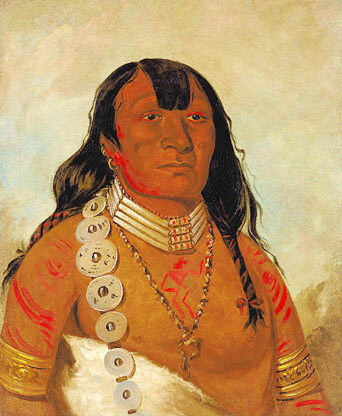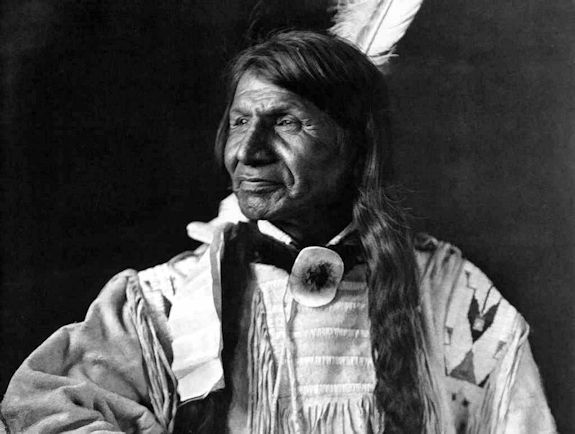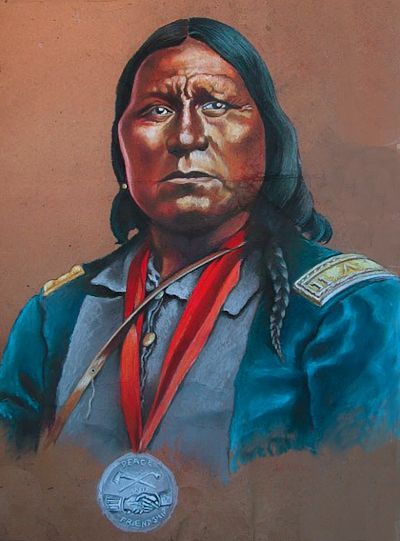Adoeette (ado ‘tree,’ e-et ‘great,’ te personal suffix: ‘Big Tree’) – A Kiowa chief, born about 1845.
Ahpeahtone (1856–1931) – chief
Tristan Ahtone (b. 1981) – Award winning journalist.
Richard Aitson (b. 1953) – bead artist and poet.
Spencer Asah – Painter, one of the Kiowa Six.
James Auchiah – Painter, one of the Kiowa Six.
Big Bow, (1833–ca. 1900) – War chief.
Michael C. Satoe Brown (b. 1961) – Contemporary painter.
T. C. Cannon – Painter and printmaker.
Jesse Ed Davis (1944–1988), Kiowa–Muscogee Creek–Seminole guitarist.
Dohasan (Dohásän, ‘little bluff’; also Dohá, Doháte, ‘bluff’) – The hereditary name of a line of chiefs of the Kiowa for nearly a century. It has been borne by at least four members of the family:
The first of whom there is remembrance was originally called Pá-do‛gâ′-i or Padó‛gå, ‘White-faced-buffalo-bull’, and this name was afterward changed to Dohá, or Doháte. He was a prominent chief.
His son was originally called Ä′anoñ′te (a word of doubtful etymology), and afterward took his father’s name of Doháte, which was changed to Dohasan, Little Doháte, or Little-bluff, for distinction. He became a great chief, ruling over the whole tribe from 1833 until his death on Cimarron River in 1866, since which time no one has had unquestioned allegiance in the tribe. His portrait was painted in 1834 by Catlin, who calls him Teh-toot-sah, and his name appears in the treaty of 1837 as ”To-ho-sa, the Top of the Mountain.”
His son, whose widow is Ankímä, inherited his father’s name, Dohásän. He was also a distinguished warrior, and died about 1894. His scalp shirt and war-bonnet case are in the National Museum. Dohasan II, the greatest chief in the history of the Kiowa tribe, in 1833 succeeded A‛dáte, who had been deposed for having allowed his people to be surprised and massacred by the Osage in that year. It was chiefly through his influence that peace was made between the Kiowa and Osage after the massacre referred to, which has never been broken. In 1862, when the Cheyenne, Arapaho, Comanche, Kiowa, and Kiowa Apache were assembled on Arkansas River to receive annuities, the agent threatened them with punishment if they did not cease their raids. Dohasan listened in perfect silence to the end, when he sprang to his feet, and calling the attention of the agent to the hundreds of tipis in the valley below, gave a famous speech. In addition to the treaty of 1837 Dohasan was also a signer of the treaty of Ft Atkinson, Ind. T., July 27, 1853, and treaty of October 18, 1865, on Little Arkansas River, Kansas.
The nephew of the great Dohásän II and cousin of the last mentioned (3) was also called Dohásän, and always wore a silver cross with the name “Tohasan” engraved upon it. He was the author of the Scott calendar and died in 1892. Shortly before his death he changed his name to Dánpä′ , shoulder-blade, from dán, shoulder (?), leaving only Ankímä’s husband to bear the hereditary name, which is now extinct.
Drum Groups: Prominent contemporary powwow drums led by Kiowa singers include: Cozad Singers, (NAMMY winners), Bad Medicine Singers , Zotigh Singers , and Thunder Hill Singers. All four drum groups have won the prestigious Gathering of Nations Southern Challenge.
Teri Greeves (b. 1970) – Bead artist.
Sharron Ahtone Harjo (b. 1945) – Painter, ledger artist.
Jack Hokeah – Painter, one of the Kiowa Six.
Vanessa Paukeigope Jennings (b. 1952) – Bead artist, clothing and regalia maker.
Kicking Bird (1835–1875) – War chief.
Kiowa Six – A group of six famous Kiowa artists from Oklahoma in the 20th century.
Lone Wolf (Gui-pah-gho), The Elder – A Kiowa Principal Chief, one of the 9 signers of the treaty of Medicine Lodge, Kansas in 1867, by which the Kiowa first agreed to be placed on a reservation. In 1872 he headed a delegation to Washington.
The killing of his son by the Texans in 1873 embittered him against the whites, and in the outbreak of the following year he was the recognized leader of the hostile part of the tribe. On the surrender in the spring of 1875 he and a number of others was sent to military confinement at Ft. Marion, Florida, where they remained 3 years. He died in 1879, shortly after his return, and was succeeded by his adopted son, of the same name.
Tom Mauchahty-Ware – Kiowa-Comanche flutist and dancer.
Parker McKenzie (1897–1999) – Traditionalist and linguist.
Arvo Quoetone Mikkanen (born April 1961) – An Assistant United States Attorney in the Office of the United States Attorney for the Western District of Oklahoma and a former federal judicial nominee for the United States District Court for the Northern District of Oklahoma.
N. Scott Momaday – Poet and novelist. In 1969, he was awarded the Pulitzer Prize for his first novel, The Way to Rainy Mountain (1968). Momaday’s writing is filled with stories about himself and his people, the Kiowa, especially his first book, and in his works called The Gourd Dancer (1976), The Names (Sun Tracks) (1976), The Ancient Child (1989), and In the Presence of the Sun: A Gathering of Shields (1992).
Stephen Mopope – Painter, one of the Kiowa Six.
Betty Nixon – Co-founder of the Mid-America All-Indian Center.
Cornel Pewewardy (flutist Comanche/Kiowa) is a leading performer of Kiowa/Southern Plains music, including Kiowa Christian hymns which include prominent glissandos.
Horace Poolaw (1906–1984) – Photographer
Sleeping Wolf – Sleeping wolf (proper name Gui-k̉ ati, ‘Wolf lying down’). Second chief of the Kiowa, a delegate to Washington in 2872 , and a prominent leader in the outbreak of 1874-75. He was shot and killed in a quarrel with one of his own tribe in 1877. The name is hereditary in the tribe and has been borne by at least 5 successive individuals, the first of whom negotiated the permanent peace between the Kiowa and Comanche about 1790.
Satanta (properly Set-taiñ’-te, ‘White Bear’) – The most famous Kiowa chief, born about 1830; died in prison, Oct. 11, 1878. For about 15 years before his death he was recognized as second chief in his tribe, the first rank being accorded to his senior, Setängyä, or Satank, and later to Lone Wolf, although probably neither of these equaled him in force and ability. His eloquence in council gained for him the title of “Orator of the Plains,” while his boldness and directness and keen humor made him a favorite with army officers and commissioners in spite of his known hostility to the white man’s laws and civilization. He was one of the signers of the Medicine Lodge treaty of 1867, by which his tribe agreed to go on a reservation, his being the second Kiowa name attached to the document. The tribe, however, delayed coming in until compelled by Custer, who seized Satanta and Lone Wolf as hostages for the fulfillment of the conditions. For boastfully avowing his part in a murderous raid into Texas in 1871, he, with Setangya and Big Tree, was arrested and held for trial in Texas. Setangya was killed while resisting the guard. The other two were tried and sentenced to life imprisonment in the Texas State penitentiary. Two years later they were released, conditional upon the good behavior of their people, but in the fall of 1874, the Kiowa having again gone on the warpath, Satanta was rearrested and taken back to the penitentiary where he finally committed suicide (or died trying to escape) by throwing himself from an upper story of the penitentiary hospital.
Quotes from Kiowa Chief Santana
Set’aide (White Bear) – Prominent war chief in the 1800s.
Setangya (Set-äbgyä, ‘Sitting Bear’) – A noted Kiowa chief and medicine man, and leader of the principal war society of the tribe. commonly known to the whites as Satank. He was born in the Black Hills region about the year 1810, his paternal grandmother having been a Sarsi woman. He became prominent at an early age, and is credited with having been a principal agent in negotiating the final peace between the Kiowa and the Cheyenne about 1840. His name heads the list of signers of the noted Medicine Lodge treaty of 1867.
In 1870 his son was killed by the whites while raiding in Texas. The father went down into Texas, gathered the bones into a bundle and brought them back, carrying them about with him upon a special horse until himself was killed about a year later. On May 17, 1871, in company with Settainte he led an attack on a wagon train in Texas, by which 7 white men lost their lives.
On making public boast of the deed to the agent at Ft Sill, in the present Oklahoma, shortly afterward, he and two others were arrested by military authority to be sent to Texas for trial. Setangya, however, refused to be a prisoner, and deliberately inviting death, sang his own death song, wrenched the fetters from his wrists, and drawing a concealed knife sprang upon the guard and was shot to death by the troops surrounding him. He was buried in the military cemetery at Ft Sill.
Sitting Bear (Set-Tank, Set-Angia, Setangya, also called Satank) (ca. 1800—1871) – Kiowa War chief and medicine man, participated in the Warren Wagon Train Raid.
Silver Horn (1860–1940) – Artist and calendar keeper.
Lois Smoky – Bead artist and painter, one of the Kiowa Six.
Monroe Tsatoke – Painter, one of the Kiowa Six.
Terry Tsotigh – Flutist.
Tsau lau te (Cry of the Wild Goose) – Son of Chief Satanta, Kiowa
Red Warbonnet (d. 1849) – Traditionalist.
White Horse (Tsen-tainte) (d. 1892) – chief
Chris Wondolowski – US professional soccer player.
Kiowa Tribes:
Kiowa Indian Tribe of Oklahoma


